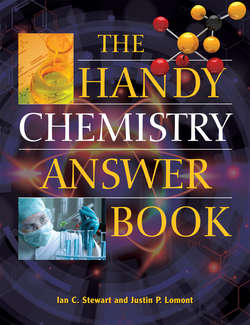Читать книгу The Handy Chemistry Answer Book - Justin P. Lomont - Страница 28
На сайте Литреса книга снята с продажи.
OTHER KINDS OF CHEMICAL REACTIONS
ОглавлениеWhy does iron rust?
Rust is iron that has been oxidized. The oxidation of iron, or any iron alloy (See “History of Chemistry”), can occur whenever iron is in the presence of oxygen and water. The chemical reaction involves electrons from the iron being transferred to oxygen atoms, which react with water molecules to eventually form iron oxides. The presence of ions, like salt or H3O+ in acidic solutions, can accelerate the rate of these reactions. Preventing rust usually requires a protective coating that prevents the iron from reacting with oxygen and water.
Is melting a chemical reaction?
No, melting is not a chemical reaction. Melting is a change between phases of matter, and it does not involve the breaking or formation of any new chemical bonds. As the temperature increases to cause a substance to melt, the arrangement of the molecules in the solid/liquid changes, but no chemical reaction takes place. The same is true for liquid to gas phase changes as well as for the reverse processes (freezing and condensing).
Everyone is familiar with rust, which is what happens when iron oxidizes—the result of iron being exposed to water and oxygen.
What is thermite?
Thermite is a mixture of a metal powder and a metal oxide that is capable of causing a very strong exothermic reaction. Different metals can be used, but the most common mixture is iron oxide (Fe2O3) and aluminum (Al) powder. The mixture is stable at room temperature, but when it is ignited, it burns in an incredibly exothermic reaction, releasing a lot of heat.
